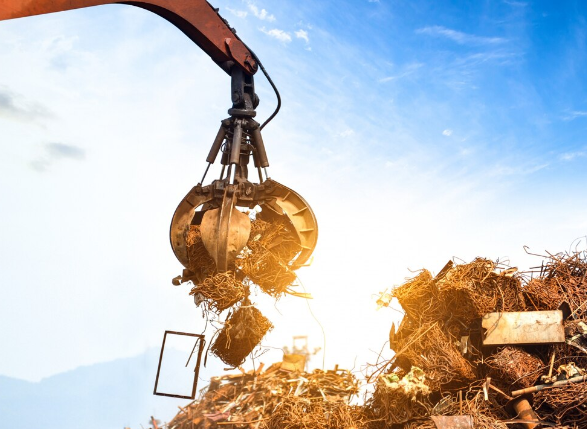Scrap metal recycling plays a pivotal role in sustainable development by significantly reducing environmental impact. As society becomes increasingly conscious of the need to protect the planet, understanding the importance of scrap metal recycling becomes essential. This article delves into the environmental benefits of scrap metal recycling and explains why it matters.
Reducing Waste in Landfills
One of the most immediate and visible benefits of scrap metal recycling is the reduction of waste in landfills. When scrap metal is recycled, it is diverted from landfills, where it would otherwise contribute to the growing problem of waste management. Landfills are not only unsightly but also pose significant environmental hazards, including soil and water contamination from leachate, the liquid that drains or ‘leaches’ from a landfill. By recycling scrap metal, we decrease the volume of waste in these sites, thereby reducing their negative impact on the environment.
Conservation of Natural Resources
Mining and processing raw materials such as iron ore, bauxite, and copper require substantial amounts of energy and water, and these processes often lead to environmental degradation. Scrap metal recycling conserves these precious natural resources by providing an alternative source of raw materials. For instance, recycling steel saves up to 74% of the energy required to produce new steel from raw materials. Similarly, recycling aluminum saves up to 95% of the energy needed for primary production. By reusing existing materials, we reduce the demand for virgin resources, thereby lessening the strain on the planet’s ecosystems.
Energy Savings
The energy savings associated with scrap metal recycling are profound. The process of recycling metal typically consumes far less energy compared to producing new metals from ore. This is because recycled metals require less processing. For example, producing new aluminum from bauxite ore requires intense energy input, primarily because of the electrolysis involved. In contrast, recycling aluminum uses only a fraction of that energy. These energy savings translate into lower greenhouse gas emissions, contributing to the fight against climate change.
Reduction of Greenhouse Gas Emissions
Scrap metal recycling significantly reduces greenhouse gas emissions. The production of metals from raw materials is energy-intensive and typically involves burning fossil fuels, which release large amounts of carbon dioxide and other greenhouse gases. Recycling metals, on the other hand, requires less energy and thus produces fewer emissions. For instance, recycling one ton of steel prevents the emission of 1.5 tons of carbon dioxide. This reduction is crucial in the global effort to mitigate climate change and its associated impacts.
Pollution Reduction
The mining and processing of virgin metals can result in significant air and water pollution. Mining activities often release harmful chemicals and heavy metals into the environment, contaminating soil and water sources. The smelting process can also release sulfur dioxide and other pollutants into the atmosphere, contributing to acid rain and respiratory problems in humans. Scrap metal recycling helps mitigate these environmental hazards by reducing the need for mining and smelting activities. Consequently, this leads to a decrease in air and water pollution, promoting a healthier environment.
Economic Benefits
While the environmental benefits of scrap metal recycling are paramount, the economic advantages should not be overlooked. The recycling industry creates jobs and contributes to the economy by providing raw materials for manufacturing. Recycling metals can also be cost-effective for businesses, as recycled materials are often less expensive than new ones. This economic aspect reinforces the sustainability of scrap metal recycling, making it a practical choice for industries and consumers alike.
Promoting a Circular Economy
Scrap metal recycling is a key component of the circular economy, an economic system aimed at minimizing waste and making the most of resources. In a circular economy, products and materials are kept in use for as long as possible, through reuse, repair, refurbishment, and recycling. By recycling scrap metal, we ensure that valuable materials are continuously reintroduced into the production cycle, reducing the need for new resources and minimizing environmental impact. This sustainable approach contrasts sharply with the traditional linear economy, where products are made, used, and then discarded.
Encouraging Sustainable Practices
The importance of scrap metal recycling extends beyond its direct environmental benefits. It also plays a crucial role in encouraging sustainable practices among businesses and consumers. By demonstrating the feasibility and benefits of recycling, it fosters a culture of sustainability and responsibility. Companies that prioritize recycling often implement other environmentally friendly practices, contributing to broader environmental stewardship. Consumers, too, are more likely to adopt sustainable habits when they see tangible results from their efforts.
Conclusion
Scrap metal recycling is more than just an efficient way to manage waste—it is a vital practice for protecting the environment and conserving natural resources. By reducing landfill waste, conserving energy, cutting greenhouse gas emissions, and reducing pollution, scrap metal recycling makes a significant positive impact on the planet. Furthermore, it promotes economic benefits and supports the principles of a circular economy. As the world continues to grapple with environmental challenges, the importance of scrap metal recycling cannot be overstated. It is a crucial component of a sustainable future, demonstrating how responsible resource management can lead to substantial environmental and economic benefits.





